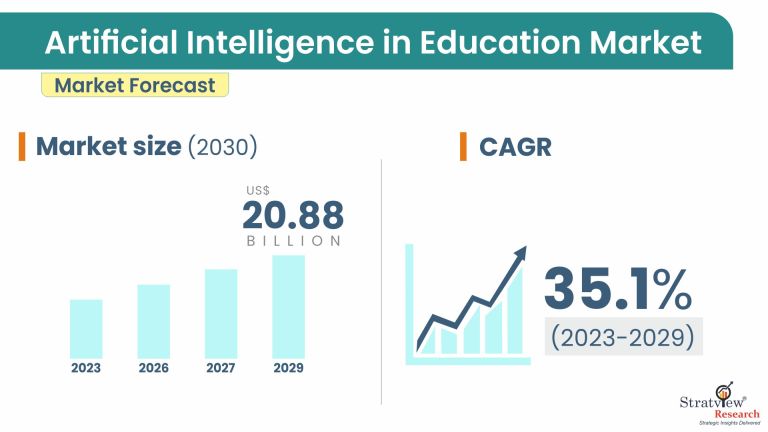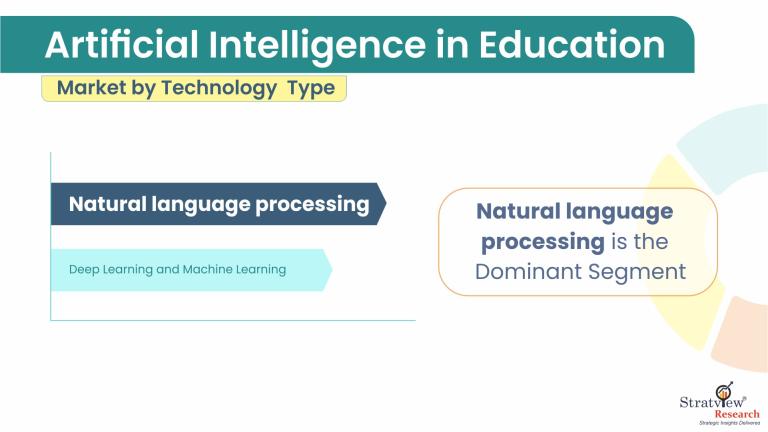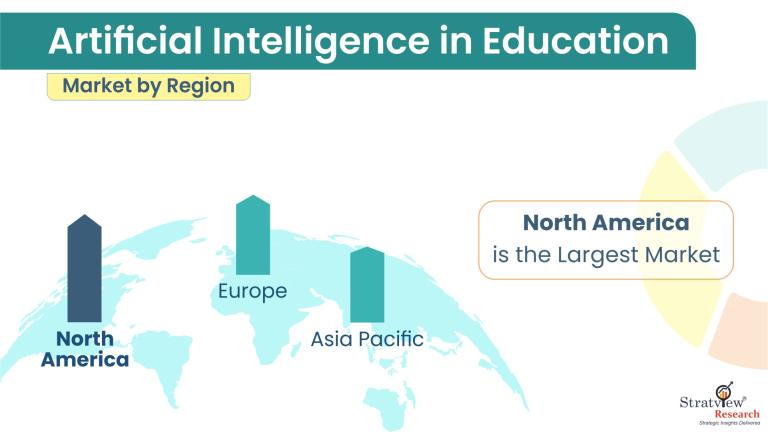Artificial Intelligence in Education Market Insights
“The global artificial intelligence in education market was estimated at US$ 2.54 billion in 2022 and is expected to grow at an impressive CAGR of 35.1% during 2023-2029 to reach US$ 20.88 billion by 2029.”

Want to get a free sample? Register Here
Introduction
Artificial Intelligence (AI) in education refers to the integration of advanced technologies to enhance and streamline the learning process. AI applications in education include intelligent tutoring systems, personalized learning platforms, and data analytics to optimize educational outcomes. Machine learning algorithms analyze student’s performance data, adapting teaching methods to individual needs. Virtual assistants and chatbots provide instant support, while AI-driven assessment tools offer efficient feedback.
AI also aids in automating administrative tasks, allowing educators to focus on personalized instruction. The goal is to create a more adaptive, interactive, and inclusive educational experience, fostering improved engagement and better academic achievement for learners at all levels.
Market Dynamics
Market Dynamics
Drivers: AI technology to enhance and improve teacher’s and student’s knowledge and experience level.
AI technology vendors are currently working on creating AI-powered electronic devices through the development of sophisticated learning programs that enhance the learning process. As the educational sector becomes increasingly competitive, institutions need to ensure that they offer the best possible learning experience to students. For example, Century Intelligent Learning has created a classroom that utilizes AI technology to enable teachers to design academic syllabi online, making them accessible to students at any time.
In addition, AI technology is utilized to identify knowledge gaps and suggest subject choices to students based on the results of aptitude tests. These tests are analyzed by AI technology to determine the strengths and weaknesses of individual students. The implementation of AI-enabled solutions and services in the education sector helps to improve the overall experience and knowledge level of both teachers and students. These solutions and services also provide teachers and parents with valuable insights into their learner’s performance.
Restraint: Slow digitalization rate.
AI-enabled deployments in developing countries are heavily reliant on existing IT infrastructures, data, and IoT devices, due to insufficient funds for basic IT infrastructure requirements. To generate accurate results, AI technology developments, cloud infrastructures, big data, and organized data filing are essential for the successful implementation of AI platforms in the education sector.
The implementation of AI-enabled solutions in education requires both online and offline environments to produce effective outcomes. While developed countries are witnessing significant technical adaptability, emerging economies are expected to experience a slower growth rate in terms of digitalization, resulting in a slower growth rate for Artificial Intelligence in education market.
Opportunity: Increasing demand for AI technology to improve education systems.
In the current era, classroom sizes are expanding rapidly, which can limit interactions between teachers and students. However, AI technology offers a solution by analyzing vast amounts of data to assess student performance. This technology is transforming traditional educational processes and enhancing relationships between educational institutions and corporations. By streamlining educational processes, AI technology is helping to modernize educational institutions.
Institutes and universities are utilizing AI platforms to develop AI tools that can help address student’s academic needs and challenges. By leveraging these tools, educational institutions can enhance student performance and productivity over time. As a result, the demand for intelligent business processes is expected to increase, creating opportunities for growth in the global Artificial Intelligence in education market.
Challenge: Lack of appropriateness of AI-driven assessment processes.
Assessment processes in education typically involve a variety of question types, including true/false, fill-in-the-blanks, multiple-choice questions, short answers, and essays. While AI-enabled assessment software can effectively evaluate objective answers, it struggles to accurately assess descriptive answers that require logical thinking, situational judgment, and content accuracy.
However, ongoing improvements to AI solutions are expected to enhance their accuracy in this regard. Addressing this challenge requires recognition of the nature of the disorders, the level of AI technology necessary for selecting appropriate assessments, and training tools that facilitate desired outcomes.
Segments Analysis
|
Segmentations
|
List of Sub-Segments
|
Dominant and Fastest-Growing Segments
|
|
Technology Type
|
Deep Learning and Machine Learning, Natural Language Processing
|
Natural language processing technology leads the market during the forecast period.
|
|
Application Type
|
Virtual Facilitators and Learning Environments, Intelligent Tutoring Systems, Content Delivery Systems, Fraud, and Risk Management, Student-initiated Learning
|
The virtual facilitators and learning environments application is expected to dominate the market during the forecast period.
|
|
Region Analysis
|
North America, Europe, Asia-Pacific, and the Rest of the World
|
North America is expected to be dominant in the market during the forecast period.
|
Technology Insights
“Natural language processing technology is growing at a higher CAGR over the forecast period.”
The market is segmented into Deep Learning and Machine Learning, Natural Language Processing. Natural language processing technology grows at a higher CAGR over the forecast period. This growth is driven by the increasing demand for virtual support in K-12 schools and universities, as well as the rising investments in advanced technology by educational institutes. Moreover, the use of NLP technology in the education industry is increasing as it can help read information stored in digital formats and understand human languages from various data sets.

Want to get a free sample? Register Here
Application Insights
“The virtual facilitators and learning environments segment accounted for the largest market share.”
The market is segmented into Virtual Facilitators and Learning Environments, Intelligent Tutoring Systems, Content Delivery Systems, Fraud, and Risk Management, Student-initiated Learning. The virtual facilitators and learning environments application is expected to have the largest market size by 2023. Digital education learning technology, also known as virtual facilitators and learning environments (VLEs), encompasses various functions such as knowledge delivery, academic mapping, student engagement, administration, and real-time communication and collaboration.
With the help of AI, virtual facilitators can act as instructor support, mentors, and multilingual translators for students. VLEs are particularly useful for independent educational programs and home-based education, as they can meet individual learning requirements.
Furthermore, virtual environments allow students to solve complex real-time social problems using multiple disciplines and principles related to social development. VLEs use simulation, games, and AI technology to engage students and enhance their learning experience, allowing them to gain and improve their knowledge level.
Regional Insights
“North America is expected to be dominant in the market accounting for over 35% of the revenue share.”
North America is expected to be dominant in the market accounting for over 35% of the revenue share. This is due to several factors, including the presence of leading companies that develop AI solutions and services, robust technology infrastructure facilities, and many end-users utilizing educational devices for AI in education.
For example, in October 2021, IBM Corporation announced a plan to provide more than 170 industry and academic partnerships to over 30 million people with new skills by 2030. This initiative is aimed at addressing the growing skills gap, democratizing opportunity, and equipping the next generation of workers with the skills they need to build a better future.

Want to get a free sample? Register Here
Key Players
The market is highly populated with the presence of several local, regional, and global players. Most of the major players compete in some of the governing factors including price, product offerings, regional presence, etc.
The following are the key players in the global artificial intelligence in education market (arranged alphabetically).
- ALEKS (US)
- AWS (US)
- Blackboard (US)
- Bridge-U (UK)
- Carnegie Learning (US)
- Century-Tech (UK)
- Cognii (US)
- Cognizant (US)
- DreamBox Learning (US)
- Elemental Path (US)
- Fishtree (US)
- Google (US)
- IBM (US)
- Jellynote (France)
- Jenzabar (US)
- Knewton (US)
- Liulishuo (China)
- Metacog (US)
- Microsoft (US)
- Nuance Communications (US)
- Osmo (US)
- Pearson (UK)
- Quantum Adaptive Learning (US)
- Querium Corporation (US)
- Third Space Learning (UK)
Note: The above list does not necessarily include all the top players in the market.
Are you the leading player in this market? We would love to include your name. Write to us at sales@stratviewresearch.com
Recent Developments of Artificial Intelligence in Education Market
-
In February 2023, Abu Dhabi-based Mohamed bin Zayed University launched a brand-new AI Center of Excellence, backed by IBM’s technology and consulting power.
-
In November 2022, AWS launched a new AI program for community colleges, minority-serving institutions, and HBCUs.
-
In May 2022, the Institute of Technical Education (ITE) and Microsoft launched an AI Lab in ITE College East, which serves as an innovation center to bring in AI concepts, skills, and applications across industries to ITE students.
Report Features
This report provides market intelligence most comprehensively. The report structure has been kept so that it offers maximum business value. It provides critical insights into market dynamics and will enable strategic decision-making for existing market players as well as those willing to enter the market. The following are the key features of the report:
- Market structure: Overview, industry life cycle analysis, supply chain analysis.
- Market environment analysis: Growth drivers and constraints, Porter’s five forces analysis, SWOT analysis.
- Market trend and forecast analysis.
- Market segment trend and forecast.
- Competitive landscape and dynamics: Market share, Service portfolio, New Product Launches, etc.
- COVID-19 impact and its recovery curve.
- Attractive market segments and associated growth opportunities.
- Emerging trends.
- Strategic growth opportunities for the existing and new players.
- Key success factor
Scope of the Report
|
Artificial Intelligence in Education Market Report Overview
|
|
Market Size in 2029
|
USD 20.88 Billion
|
|
Market Size in 2022
|
USD 2.54 Billion
|
|
Market Growth (2023-2029)
|
35.1%
|
|
Forecast Period
|
2023-2029
|
|
Base Year of Study
|
2022
|
|
Trend Period
|
2017-2021
|
Research Methodology
This strategic assessment report from Stratview Research provides a comprehensive analysis that reflects today’s artificial intelligence in education market realities and future market possibilities for the forecast period. The report segments and analyzes the market in the most detailed manner in order to provide a panoramic view of the market. The vital data/information provided in the report can play a crucial role for market participants as well as investors in the identification of the low-hanging fruits available in the market as well as to formulate the growth strategies to expedite their growth process.
This report offers high-quality insights and is the outcome of a detailed research methodology comprising extensive secondary research, rigorous primary interviews with industry stakeholders, and validation and triangulation with Stratview Research’s internal database and statistical tools. More than 1,000 authenticated secondary sources, such as company annual reports, fact books, press releases, journals, investor presentations, white papers, patents, and articles, have been leveraged to gather the data. We conducted more than 15 detailed primary interviews with market players across the value chain in all four regions and industry experts to obtain both qualitative and quantitative insights.
Customization Options
With this detailed report, Stratview Research offers one of the following free customization options to our respectable clients:
Company Profiling
- Detailed profiling of additional market players (up to three players)
- SWOT analysis of key players (up to three players)
Competitive Benchmarking
- Benchmarking of key players based on the following parameters: Product portfolio, geographical reach, regional presence, and strategic alliances
Custom Research: Stratview Research offers custom research services across sectors. In case of any custom research requirement related to market assessment, competitive benchmarking, sourcing and procurement, target screening, and others, please send your inquiry to sales@stratviewresearch.com

